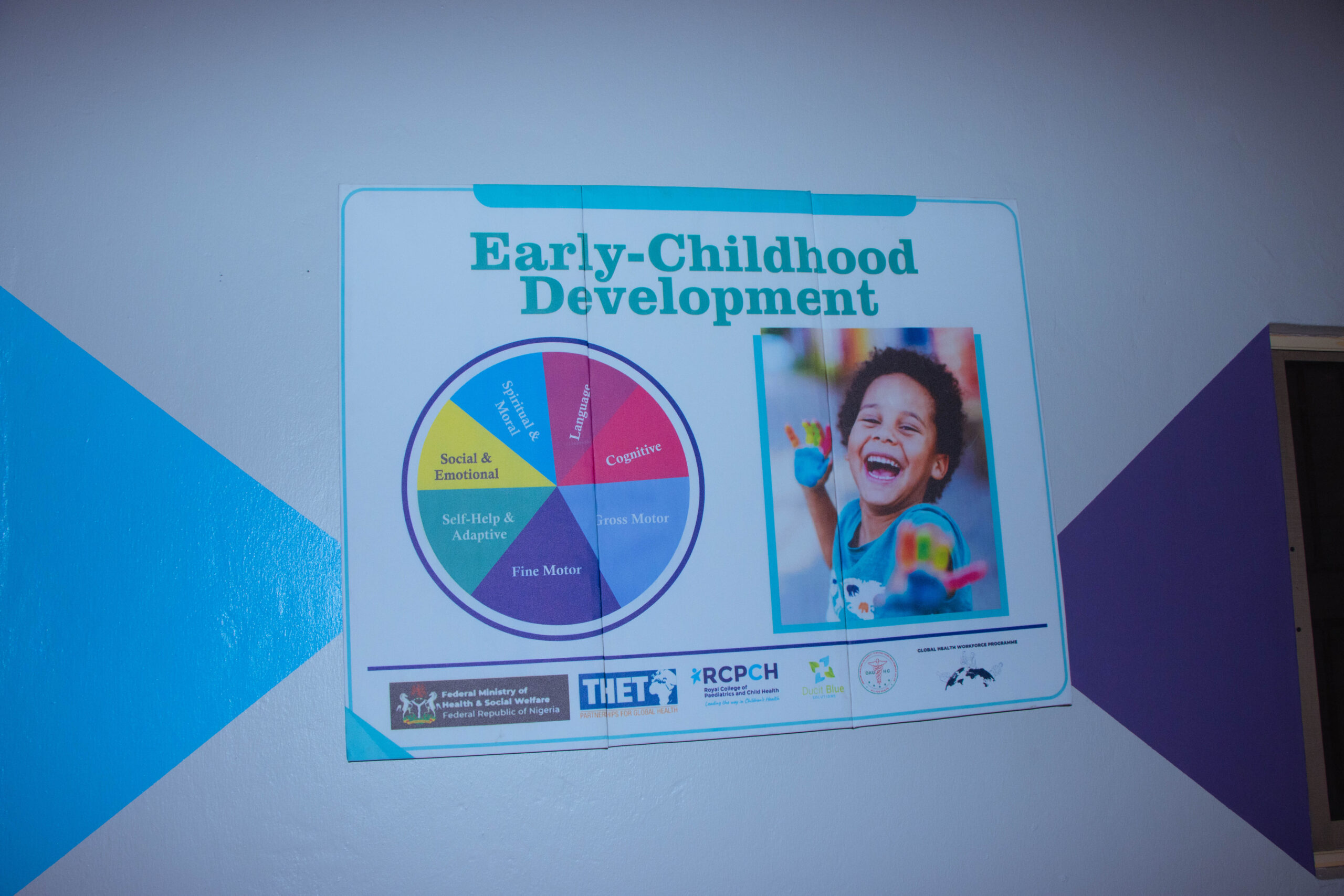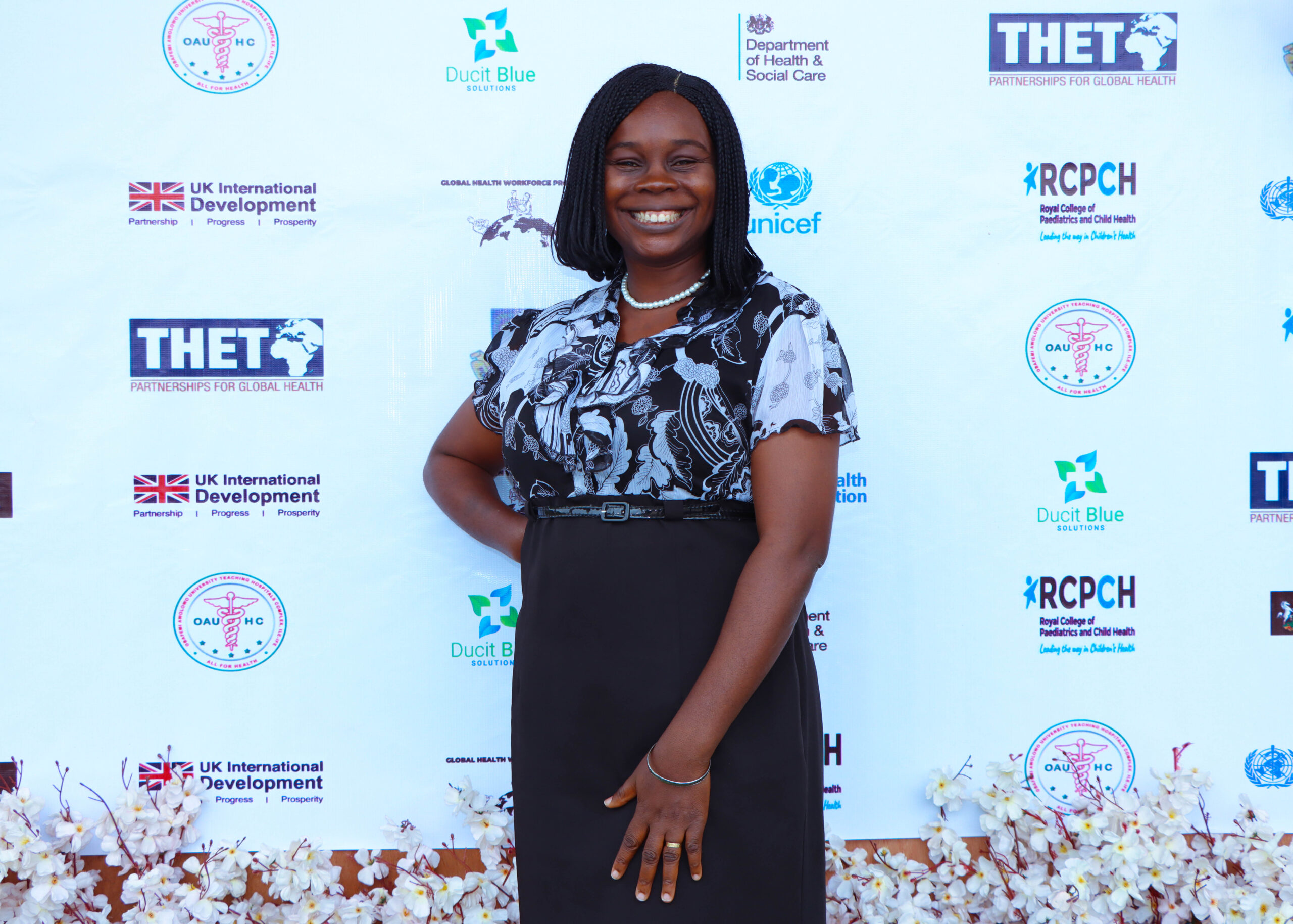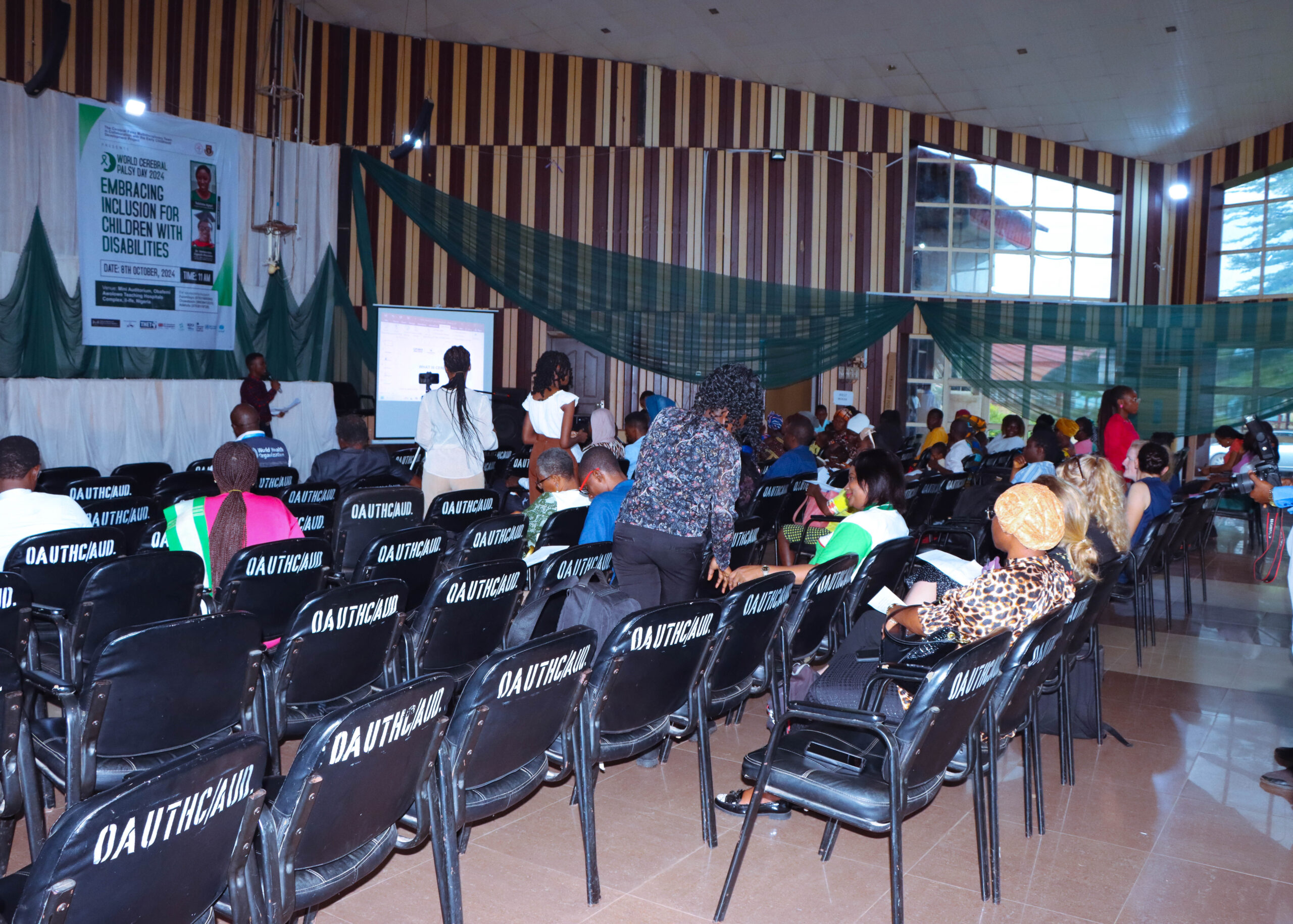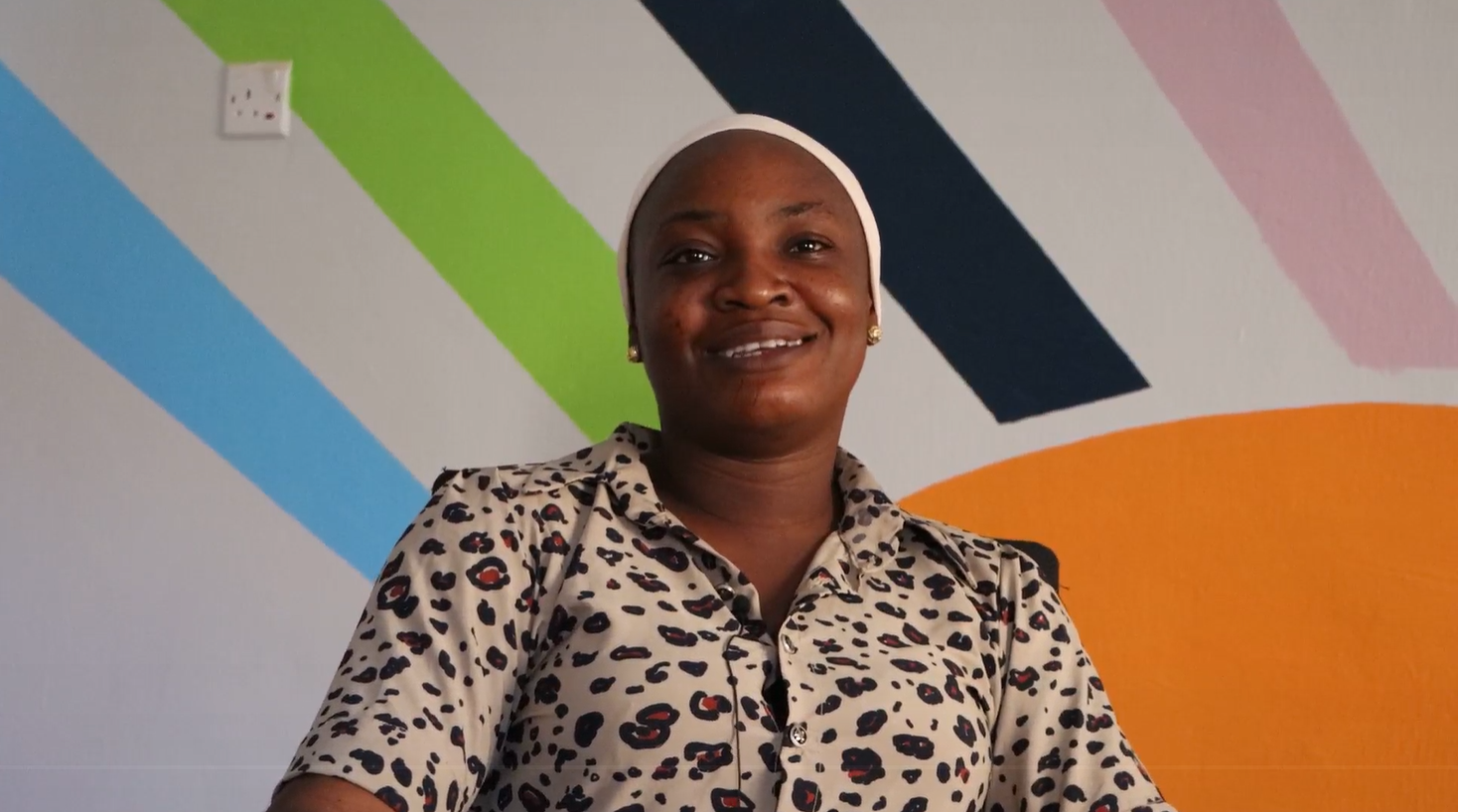Improving Early Childhood Development for children with disabilities in Osun State, Nigeria
9 January 2025

Sub-Saharan Africa is home to approximately 15 million children with developmental disorders.[1] In Nigeria, along with many countries in Africa, improvements in maternal and neo-natal care have resulted in more children surviving prematurity or asphyxiation at birth, leading to an increased number of children with neuro-developmental conditions.
However, the Nigerian health system currently lacks the capacity to provide the specialised care needed, leaving many without access to medical interventions and therapeutic inputs. Despite the Nigerian government’s commitment to enhancing Early Childhood Development (ECD) services, coverage remains significantly inadequate.
The Project
As part of the Global Health Workforce Programme (GHWP), the Health Partnership between Obafemi Awolowo University Teaching Hospital (OAUTHC) and the Royal College of Paediatrics and Child Health (RCPCH) is working to address this defecit in care. The GHWP is funded by the UK Department of Health and Social Care and managed by Global Health Partnerships (GHP – formerly THET), with Ducit Blue Solutions acting as local grant managers for Nigeria.
In line with the Federal Ministry of Health’s commitment to: “ensure the survival, optimal growth, and development of all children in Nigeria”[2] this project aims to bridge the gap in the lack of identification and adequate early interventions for children with developmental delays and disabilities in Osun State, Nigeria by:
- strengthening the capacity of frontline workers to identify and address ECD delays through the introduction of the Malawi Development Assessment Tool (MDAT), a developmental assessment tool, adapted for primary, secondary and tertiary levels of health service delivery implementing an effective referral pathway from primary clinics to secondary and tertiary level care
- developing a centre of excellence with skilled multidisciplinary staff to provide specialist assessment and interventions
- piloting an ECD strategy for the identification and management of children with developmental delays and disabilities, and
- running caregiver support groups known as ‘Baby Ubuntu’ where caregivers can share knowledge and experiences, contributing towards inclusion and better care for children with disabilities.
Early intervention is key to improving care for children with disabilities. Neural circuits, which form the foundation for learning, behaviour, and health, are most flexible during the first three years of life. The lack of ECD services in Osun State creates a significant gap between hospital care around the time of birth, and school health screening, which typically starts around age five. This gap can lead to developmental challenges becoming “locked in” as life-long disabilities, exacerbating individual and household exclusion and undermining social and economic development potential. For children with early developmental delays and disabilities, early identification, diagnostic understanding, and appropriate referral are crucial for ensuring that any emerging delays or disabilities are addressed as early as possible.

Creating Change
Speaking with Global Health Partnerships (GHP – formerly THET), Dr Oluwatosin, co-lead in the Health Partnership and Consultant Paediatric Neurologist at the Obafemi Awolowo University Teaching Hospitals’ Complex (OAUTHC) told us:
“Before we started this early intervention, one of the things that gave me concern is the age at which a child will be presenting with developmental disabilities. Typically aged 5-10 for the first time. For therapy for neuro-disability and neurodiversity in children, it’s better to start early during the window when there’s neuroplasticity, that is when the brain is easy to make changes and the brain easily adapts to changes. Before the training tool (the MDAT), the Primary Health Centres did not typically refer. Sometimes we would see adults coming in for the first time. But now, I’ve seen that the patients are being sent at an early age. Now we get referral of infants which was not the norm before. With this intervention children below one [years] are referred, and it’s for some less than six months, and for me that is very important because I always wanted to achieve that.”
The National Health Policy aims to provide UHC to all Nigerians, with the main policy goal being to strengthen Nigeria’s health system, with a focus on primary health care (PHC) to deliver effective efficient, equitable and accessible health services.[3] The project delivered by this Health Partnership contributes towards national policy by looking to train and improve the skills of Health Workers in early identification, referral and treatment of Early Child Development across all levels of the health system, with particular focus on Primary Healthcare delivery.
Advocacy and Engagement
The Health Partnership has consistently engaged in advocacy efforts with policymakers, stakeholders and families, pushing for policy and attitudinal changes that benefit children with disabilities and their families, reducing systemic barriers to accessing services and support.
This work to empower and equip caregivers of children with developmental disabilities has been further expanded by the Health Partnership through the introduction of caregiver support groups at OAUTHC, known as ‘Baby Ubuntu’ – a model developed and pioneered in Uganda by Rachel Lassman, Global Programmes Coordinator for the Baby Ubuntu.[4] The Baby Ubuntu groups aim to promote inclusion and participation of children with disabilities within the family and community, whilst empowering caregivers with the information and support needed to provide the best care for their children.

Supporting Parents and Caregivers
Faridat Adegoke, a parent and caregiver to a child with cerebral palsy and a Parent Support group coordinator, told us why these Baby Ubuntu groups are so important to her and other parents like her:
“For the parents, I see this support group as an avenue, a place, whereby parents in the same position can come together, share experiences. We talk about our children’s condition. We share our stories. We share the pains together. We share our success together. So it has been a kind of relief. And that’s why it’s important for us because some parents see this group as being somewhere where they can come to relieve themselves of the stress involved in this journey.”

So far the Health Partnership has set up five Baby Ubuntu groups which host 10 families each, reaching 50 caregivers within the first year of the project. They aim to reach an additional 60 caregivers if the programme is extended. The support groups are proving invaluable to caregivers, creating a space for learning how to care for the special needs of their children and for sharing their challenges and gaining emotional support from peers.
Health Worker Training
As of September 2024, the Health Partnership has delivered training to 278 frontline health workers in Osun State in early identification and referral, as well as implementing a functional referral system from Primary Health Centres to OAUTHC.
Following the training delivered as part of the Global Health Workforce Programme, paediatric clinicians in OAUTHC reported feeling more comfortable and empowered in managing and referring cases of childhood developmental delay:
"Before the training, I feel I was somehow handicapped in managing some of these cases. However, after the training was held, I feel more armed to assist them. I know what steps to take. I know how to assess them adequately. I know when to actually refer them for specialist review. So I'm able to also sufficiently speak to the situation and assist them. So I feel myself more strengthened.”
- - Dr Samuel Ojo

It is clear from Dr Samuel Ojo’s testimonial that the training delivered by this Health Partnership has improved the confidence of Paediatric Clinicians to provide appropriate care and referrals for children presenting with developmental delays and disabilities.
As part of this project, the Partnership has implemented the use of different levels of child development assessment tools, adapted to fit various contexts. This includes:
- Malawi Development Assessment Tool (MDAT) – a full developmental assessment tool only for tertiary level clinicians
- MDAT IDEC (Identification of Disability in Early Childhood) – a shortened version of the MDAT for monitoring and screening for secondary level clinicians
- MDAT signs, adapted specifically for the Nigerian context and for use at Primary Health Centres where they have extremely limited resources and time (pictured).
The MDAT IDEC and MDAT signs work as tools to quickly assess the developmental stage of the child and to identify any anomalies or challenges in the child’s development, designed for use at primary and secondary level facilities. The Health Partnership has provided training on effective use of the MDAT tool to staff at the OAUTHC, training 292 health workers thus far, spanning a range of cadres including Doctors, Nurses, Community Health Officers, Community Health Extension Workers Health Assistants and Physiotherapists. Following the training Dr Samuel Ojo reported:
“It’s going to improve the care outcomes because early identification will enable early management. Before, I would just know that this child’s development is delayed, but with the MDAT tool, we’re able to categorise the children with disabilities into care pathways.
So for me, it has improved the care, it has improved the level of confidence for me and my co-workers, it has improved the level at which we relate to this patient and offer care and attendance. So, with the development tool being systematic and very objective, it helps us to identify points of challenge, and other factors that may be contributing to the challenge. Now, we have more referrals, and it’s because there’s more awareness and a perceived solution to the challenge”.

Sustainability and Scalability
The Health Partnership is working to scale up their intervention by embedding the ECD strategy into a state-wide policy, having formed a taskforce to engage stakeholders and advocate for the adoption of early intervention across Osun State. They are hoping to add the development assessment tool onto childhood immunisation cards – to ensure that the assessment of childhood development is integrated into early childhood care, representing a significant scale-up of the project into state-wide practice.
This Health Partnership is making a huge difference in care for children with developmental delays and disabilities in Nigeria. By strengthening the clinical capacity of frontline health workers and establishing a functional referral system, this project is addressing the urgent need for accessible and effective ECD services in Osun State. This will not only improve the lives of children with developmental delays and disabilities but also contribute to the overall health and well-being of the population.
References:
[1] Adugna, M. B., Nabbouh, F., Shehata, S., & Ghahari, S. (2020). Barriers and facilitators to healthcare access for children with disabilities in low and middle income sub-Saharan African countries: a scoping review. BMC health services research, 20, 1-11.
[2] https://nationalqoc.fmohconnect.gov.ng/wp-content/uploads/2023/07/NCHP2022.pdf
[3] Federal Ministry of Health & Social Welfare of Nigeria, 2020
[4] https://www.lshtm.ac.uk/research/centres/march-centre/news/372801/introducing-baby-ubuntu-and-ubuntu-hub
All images (c) by Mark Akinware for Global Health Partnerships, November 2024.
Acknowledgements:
This case study was written by Megan Clementson Cox, Communications Manager for the Global Health Workforce Programme, with support from partners: the Royal College of Paediatrics and Child Health (RCPCH) and Obafemi Awolowo University Teaching Hospitals Complex (OAUTHC), and the local grant manager Adenike Badiora. Special thanks to those interviewed :
- Dr. Oluwatosin Osagbemi-Olorunmoteni
- Dr. Samuel Ojo
- Faridat Adegoke
And those who provided detailed information on the Health Partnership and their review:
- Suzanna Bright
- Marie Bontoux
- Dr. Oluwatosin Osagbemi-Olorunmoteni
- Melissa Gladstone

